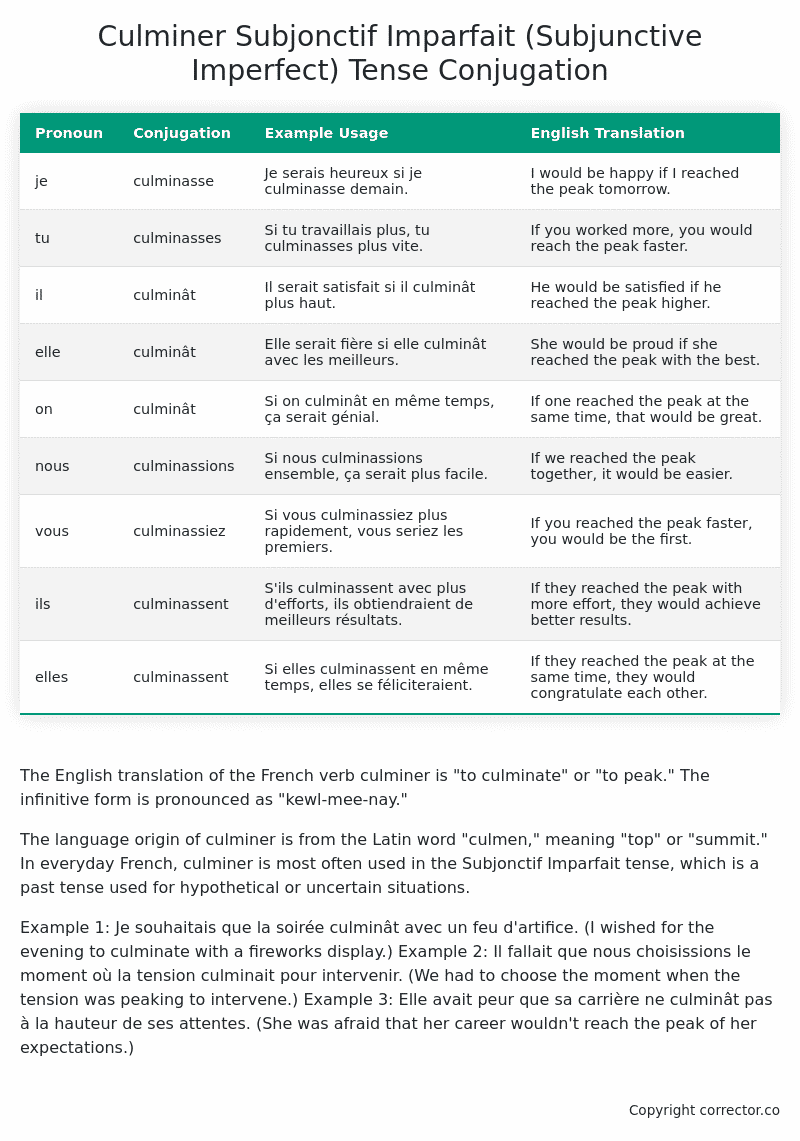Subjonctif Imparfait (Subjunctive Imperfect) Tense Conjugation of the French Verb culminer
Introduction to the verb culminer
The English translation of the French verb culminer is “to culminate” or “to peak.” The infinitive form is pronounced as “kewl-mee-nay.”
The language origin of culminer is from the Latin word “culmen,” meaning “top” or “summit.” In everyday French, culminer is most often used in the Subjonctif Imparfait tense, which is a past tense used for hypothetical or uncertain situations.
Example 1: Je souhaitais que la soirée culminât avec un feu d’artifice. (I wished for the evening to culminate with a fireworks display.)
Example 2: Il fallait que nous choisissions le moment où la tension culminait pour intervenir. (We had to choose the moment when the tension was peaking to intervene.)
Example 3: Elle avait peur que sa carrière ne culminât pas à la hauteur de ses attentes. (She was afraid that her career wouldn’t reach the peak of her expectations.)
Table of the Subjonctif Imparfait (Subjunctive Imperfect) Tense Conjugation of culminer
| Pronoun | Conjugation | Example Usage | English Translation |
|---|---|---|---|
| je | culminasse | Je serais heureux si je culminasse demain. | I would be happy if I reached the peak tomorrow. |
| tu | culminasses | Si tu travaillais plus, tu culminasses plus vite. | If you worked more, you would reach the peak faster. |
| il | culminât | Il serait satisfait si il culminât plus haut. | He would be satisfied if he reached the peak higher. |
| elle | culminât | Elle serait fière si elle culminât avec les meilleurs. | She would be proud if she reached the peak with the best. |
| on | culminât | Si on culminât en même temps, ça serait génial. | If one reached the peak at the same time, that would be great. |
| nous | culminassions | Si nous culminassions ensemble, ça serait plus facile. | If we reached the peak together, it would be easier. |
| vous | culminassiez | Si vous culminassiez plus rapidement, vous seriez les premiers. | If you reached the peak faster, you would be the first. |
| ils | culminassent | S’ils culminassent avec plus d’efforts, ils obtiendraient de meilleurs résultats. | If they reached the peak with more effort, they would achieve better results. |
| elles | culminassent | Si elles culminassent en même temps, elles se féliciteraient. | If they reached the peak at the same time, they would congratulate each other. |
Other Conjugations for Culminer.
Le Present (Present Tense) Conjugation of the French Verb culminer
Imparfait (Imperfect) Tense Conjugation of the French Verb culminer
Passé Simple (Simple Past) Tense Conjugation of the French Verb culminer
Passé Composé (Present Perfect) Tense Conjugation of the French Verb culminer
Futur Simple (Simple Future) Tense Conjugation of the French Verb culminer
Futur Proche (Near Future) Tense Conjugation of the French Verb culminer
Plus-que-parfait (Pluperfect) Tense Conjugation of the French Verb culminer
Passé Antérieur (Past Anterior) Tense Conjugation of the French Verb culminer
Futur Antérieur (Future Anterior) Tense Conjugation of the French Verb culminer
Subjonctif Présent (Subjunctive Present) Tense Conjugation of the French Verb culminer
Subjonctif Passé (Subjunctive Past) Tense Conjugation of the French Verb culminer
Subjonctif Imparfait (Subjunctive Imperfect) Tense Conjugation of the French Verb culminer (this article)
Subjonctif Plus-que-parfait (Subjunctive Pluperfect) Tense Conjugation of the French Verb culminer
Conditionnel Présent (Conditional Present) Tense Conjugation of the French Verb culminer
Conditionnel Passé (Conditional Past) Tense Conjugation of the French Verb culminer
L’impératif Présent (Imperative Present) Tense Conjugation of the French Verb culminer
L’infinitif Présent (Infinitive Present) Tense Conjugation of the French Verb culminer
Struggling with French verbs or the language in general? Why not use our free French Grammar Checker – no registration required!
Get a FREE Download Study Sheet of this Conjugation 🔥
Simply right click the image below, click “save image” and get your free reference for the culminer Subjonctif Imparfait tense conjugation!

Culminer – About the French Subjonctif Imparfait (Subjunctive Imperfect) Tense
Formation
Common Everyday Usage Patterns
Interactions with Other Tenses
Subjonctif Présent
Indicatif Passé Composé
Conditional
Conditional Perfect
Summary
I hope you enjoyed this article on the verb culminer. Still in a learning mood? Check out another TOTALLY random French verb conjugation!


